Negotiation Role Play & Summary Report: DeGrandis and Elite Stars
VerifiedAdded on 2021/01/02
|6
|1588
|170
Report
AI Summary
This report summarizes a negotiation role-play scenario involving DeGrandis Sporting Goods and Elite Sports Stars, Maria Sharapova's agency, focusing on an advertising campaign endorsement contract. The pre-negotiation stage is analyzed, including the determination of BATNA (Best Alternative To a Negotiated Agreement) and Reservation Value for both parties. DeGrandis's BATNA involves Serena Williams, with a reservation value of $613,810, while Elite Sports Stars considers Dave's Warehouse, with a reservation value of $511,510. The report identifies the ZOPA (Zone of Possible Agreement) range between these reservation values and suggests strategies for value creation, emphasizing integrative negotiation techniques to address multiple issues beyond just the contract fee. It highlights the importance of understanding each party's needs and requirements to achieve mutually beneficial outcomes, including a trade-off among contract fee, campaign length, and revenue generation. The report concludes by stressing the importance of BATNA and ZOPA in effective negotiation and value creation.

Negotiation Role Play &
Summary 2
Summary 2
Paraphrase This Document
Need a fresh take? Get an instant paraphrase of this document with our AI Paraphraser
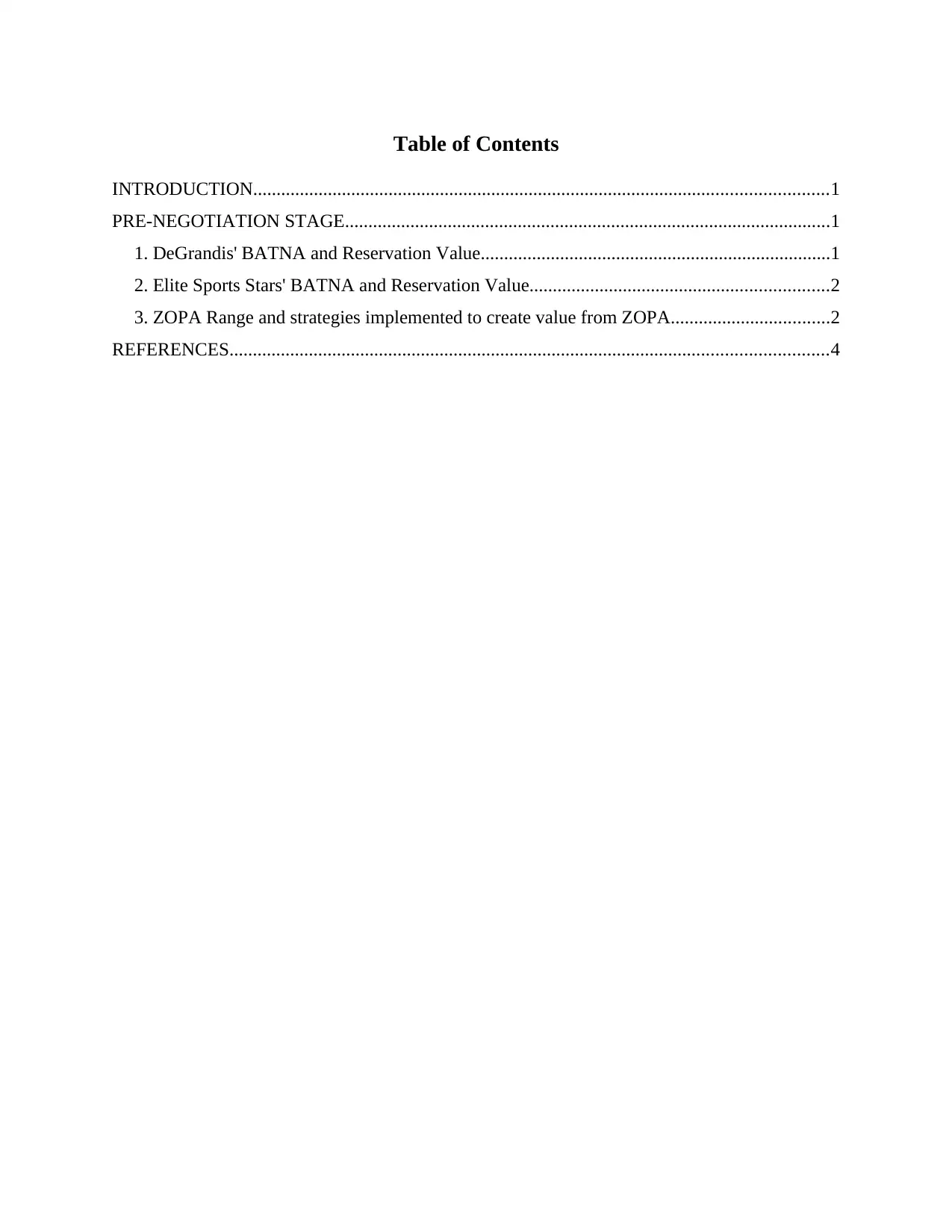
Table of Contents
INTRODUCTION...........................................................................................................................1
PRE-NEGOTIATION STAGE........................................................................................................1
1. DeGrandis' BATNA and Reservation Value...........................................................................1
2. Elite Sports Stars' BATNA and Reservation Value................................................................2
3. ZOPA Range and strategies implemented to create value from ZOPA..................................2
REFERENCES................................................................................................................................4
INTRODUCTION...........................................................................................................................1
PRE-NEGOTIATION STAGE........................................................................................................1
1. DeGrandis' BATNA and Reservation Value...........................................................................1
2. Elite Sports Stars' BATNA and Reservation Value................................................................2
3. ZOPA Range and strategies implemented to create value from ZOPA..................................2
REFERENCES................................................................................................................................4
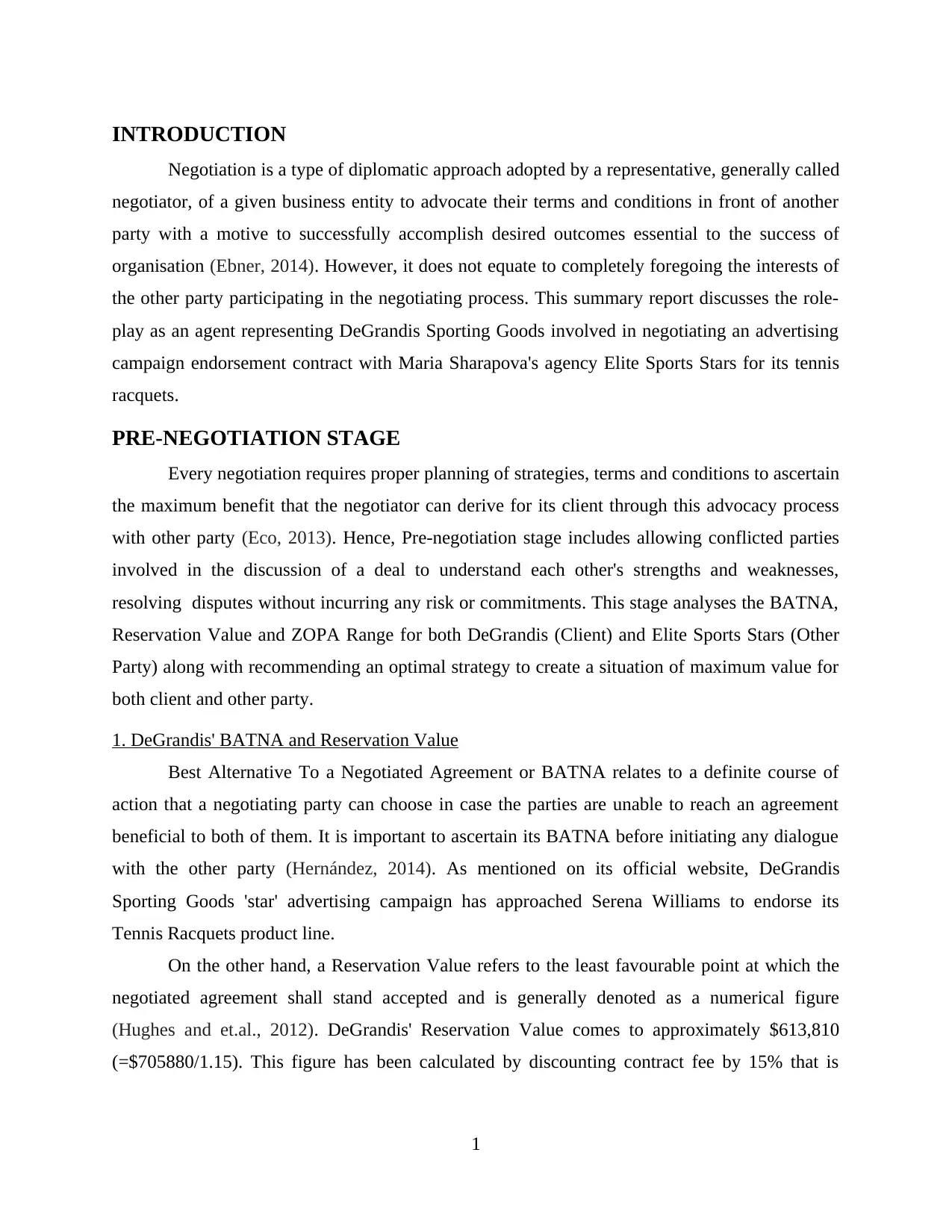
INTRODUCTION
Negotiation is a type of diplomatic approach adopted by a representative, generally called
negotiator, of a given business entity to advocate their terms and conditions in front of another
party with a motive to successfully accomplish desired outcomes essential to the success of
organisation (Ebner, 2014). However, it does not equate to completely foregoing the interests of
the other party participating in the negotiating process. This summary report discusses the role-
play as an agent representing DeGrandis Sporting Goods involved in negotiating an advertising
campaign endorsement contract with Maria Sharapova's agency Elite Sports Stars for its tennis
racquets.
PRE-NEGOTIATION STAGE
Every negotiation requires proper planning of strategies, terms and conditions to ascertain
the maximum benefit that the negotiator can derive for its client through this advocacy process
with other party (Eco, 2013). Hence, Pre-negotiation stage includes allowing conflicted parties
involved in the discussion of a deal to understand each other's strengths and weaknesses,
resolving disputes without incurring any risk or commitments. This stage analyses the BATNA,
Reservation Value and ZOPA Range for both DeGrandis (Client) and Elite Sports Stars (Other
Party) along with recommending an optimal strategy to create a situation of maximum value for
both client and other party.
1. DeGrandis' BATNA and Reservation Value
Best Alternative To a Negotiated Agreement or BATNA relates to a definite course of
action that a negotiating party can choose in case the parties are unable to reach an agreement
beneficial to both of them. It is important to ascertain its BATNA before initiating any dialogue
with the other party (Hernández, 2014). As mentioned on its official website, DeGrandis
Sporting Goods 'star' advertising campaign has approached Serena Williams to endorse its
Tennis Racquets product line.
On the other hand, a Reservation Value refers to the least favourable point at which the
negotiated agreement shall stand accepted and is generally denoted as a numerical figure
(Hughes and et.al., 2012). DeGrandis' Reservation Value comes to approximately $613,810
(=$705880/1.15). This figure has been calculated by discounting contract fee by 15% that is
1
Negotiation is a type of diplomatic approach adopted by a representative, generally called
negotiator, of a given business entity to advocate their terms and conditions in front of another
party with a motive to successfully accomplish desired outcomes essential to the success of
organisation (Ebner, 2014). However, it does not equate to completely foregoing the interests of
the other party participating in the negotiating process. This summary report discusses the role-
play as an agent representing DeGrandis Sporting Goods involved in negotiating an advertising
campaign endorsement contract with Maria Sharapova's agency Elite Sports Stars for its tennis
racquets.
PRE-NEGOTIATION STAGE
Every negotiation requires proper planning of strategies, terms and conditions to ascertain
the maximum benefit that the negotiator can derive for its client through this advocacy process
with other party (Eco, 2013). Hence, Pre-negotiation stage includes allowing conflicted parties
involved in the discussion of a deal to understand each other's strengths and weaknesses,
resolving disputes without incurring any risk or commitments. This stage analyses the BATNA,
Reservation Value and ZOPA Range for both DeGrandis (Client) and Elite Sports Stars (Other
Party) along with recommending an optimal strategy to create a situation of maximum value for
both client and other party.
1. DeGrandis' BATNA and Reservation Value
Best Alternative To a Negotiated Agreement or BATNA relates to a definite course of
action that a negotiating party can choose in case the parties are unable to reach an agreement
beneficial to both of them. It is important to ascertain its BATNA before initiating any dialogue
with the other party (Hernández, 2014). As mentioned on its official website, DeGrandis
Sporting Goods 'star' advertising campaign has approached Serena Williams to endorse its
Tennis Racquets product line.
On the other hand, a Reservation Value refers to the least favourable point at which the
negotiated agreement shall stand accepted and is generally denoted as a numerical figure
(Hughes and et.al., 2012). DeGrandis' Reservation Value comes to approximately $613,810
(=$705880/1.15). This figure has been calculated by discounting contract fee by 15% that is
1
⊘ This is a preview!⊘
Do you want full access?
Subscribe today to unlock all pages.

Trusted by 1+ million students worldwide
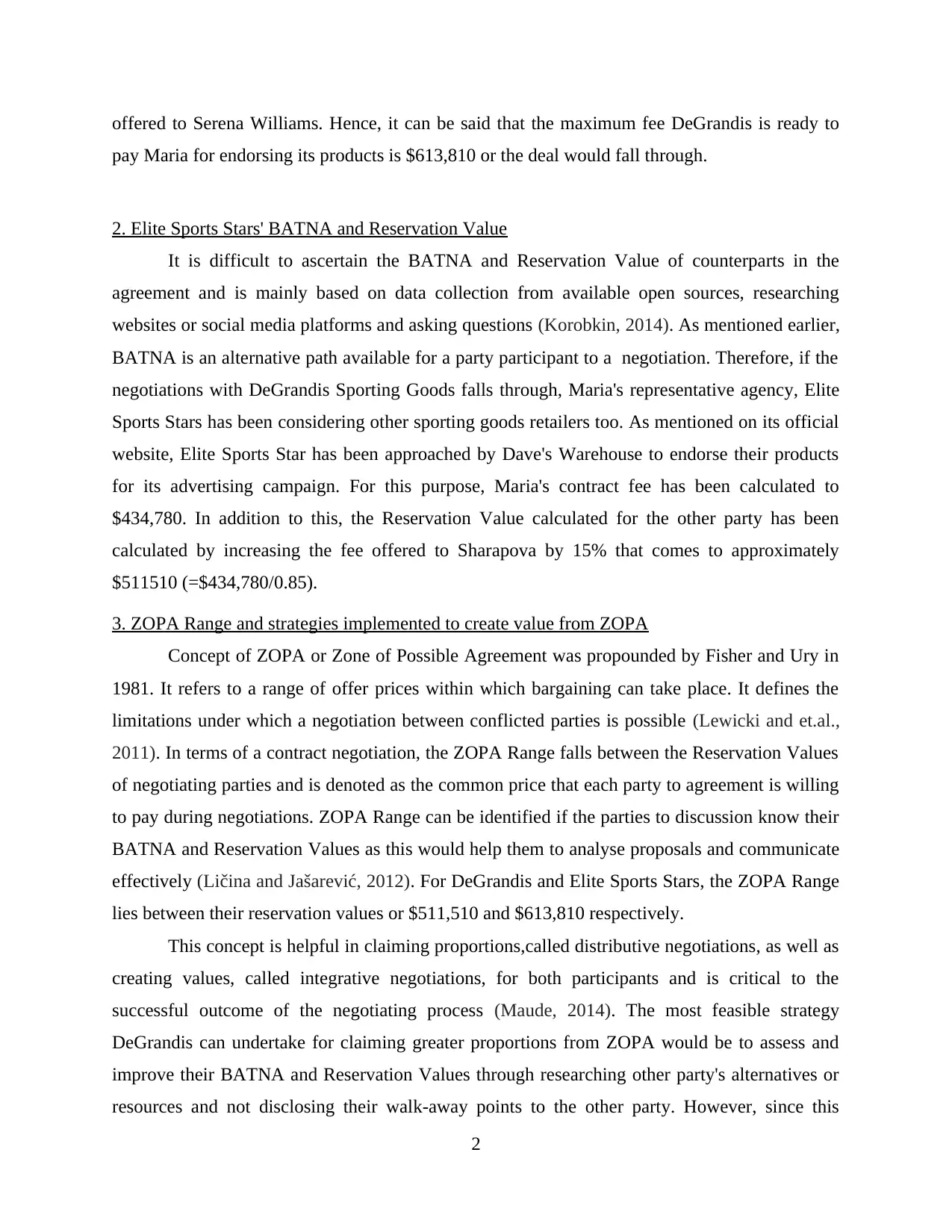
offered to Serena Williams. Hence, it can be said that the maximum fee DeGrandis is ready to
pay Maria for endorsing its products is $613,810 or the deal would fall through.
2. Elite Sports Stars' BATNA and Reservation Value
It is difficult to ascertain the BATNA and Reservation Value of counterparts in the
agreement and is mainly based on data collection from available open sources, researching
websites or social media platforms and asking questions (Korobkin, 2014). As mentioned earlier,
BATNA is an alternative path available for a party participant to a negotiation. Therefore, if the
negotiations with DeGrandis Sporting Goods falls through, Maria's representative agency, Elite
Sports Stars has been considering other sporting goods retailers too. As mentioned on its official
website, Elite Sports Star has been approached by Dave's Warehouse to endorse their products
for its advertising campaign. For this purpose, Maria's contract fee has been calculated to
$434,780. In addition to this, the Reservation Value calculated for the other party has been
calculated by increasing the fee offered to Sharapova by 15% that comes to approximately
$511510 (=$434,780/0.85).
3. ZOPA Range and strategies implemented to create value from ZOPA
Concept of ZOPA or Zone of Possible Agreement was propounded by Fisher and Ury in
1981. It refers to a range of offer prices within which bargaining can take place. It defines the
limitations under which a negotiation between conflicted parties is possible (Lewicki and et.al.,
2011). In terms of a contract negotiation, the ZOPA Range falls between the Reservation Values
of negotiating parties and is denoted as the common price that each party to agreement is willing
to pay during negotiations. ZOPA Range can be identified if the parties to discussion know their
BATNA and Reservation Values as this would help them to analyse proposals and communicate
effectively (Ličina and Jašarević, 2012). For DeGrandis and Elite Sports Stars, the ZOPA Range
lies between their reservation values or $511,510 and $613,810 respectively.
This concept is helpful in claiming proportions,called distributive negotiations, as well as
creating values, called integrative negotiations, for both participants and is critical to the
successful outcome of the negotiating process (Maude, 2014). The most feasible strategy
DeGrandis can undertake for claiming greater proportions from ZOPA would be to assess and
improve their BATNA and Reservation Values through researching other party's alternatives or
resources and not disclosing their walk-away points to the other party. However, since this
2
pay Maria for endorsing its products is $613,810 or the deal would fall through.
2. Elite Sports Stars' BATNA and Reservation Value
It is difficult to ascertain the BATNA and Reservation Value of counterparts in the
agreement and is mainly based on data collection from available open sources, researching
websites or social media platforms and asking questions (Korobkin, 2014). As mentioned earlier,
BATNA is an alternative path available for a party participant to a negotiation. Therefore, if the
negotiations with DeGrandis Sporting Goods falls through, Maria's representative agency, Elite
Sports Stars has been considering other sporting goods retailers too. As mentioned on its official
website, Elite Sports Star has been approached by Dave's Warehouse to endorse their products
for its advertising campaign. For this purpose, Maria's contract fee has been calculated to
$434,780. In addition to this, the Reservation Value calculated for the other party has been
calculated by increasing the fee offered to Sharapova by 15% that comes to approximately
$511510 (=$434,780/0.85).
3. ZOPA Range and strategies implemented to create value from ZOPA
Concept of ZOPA or Zone of Possible Agreement was propounded by Fisher and Ury in
1981. It refers to a range of offer prices within which bargaining can take place. It defines the
limitations under which a negotiation between conflicted parties is possible (Lewicki and et.al.,
2011). In terms of a contract negotiation, the ZOPA Range falls between the Reservation Values
of negotiating parties and is denoted as the common price that each party to agreement is willing
to pay during negotiations. ZOPA Range can be identified if the parties to discussion know their
BATNA and Reservation Values as this would help them to analyse proposals and communicate
effectively (Ličina and Jašarević, 2012). For DeGrandis and Elite Sports Stars, the ZOPA Range
lies between their reservation values or $511,510 and $613,810 respectively.
This concept is helpful in claiming proportions,called distributive negotiations, as well as
creating values, called integrative negotiations, for both participants and is critical to the
successful outcome of the negotiating process (Maude, 2014). The most feasible strategy
DeGrandis can undertake for claiming greater proportions from ZOPA would be to assess and
improve their BATNA and Reservation Values through researching other party's alternatives or
resources and not disclosing their walk-away points to the other party. However, since this
2
Paraphrase This Document
Need a fresh take? Get an instant paraphrase of this document with our AI Paraphraser
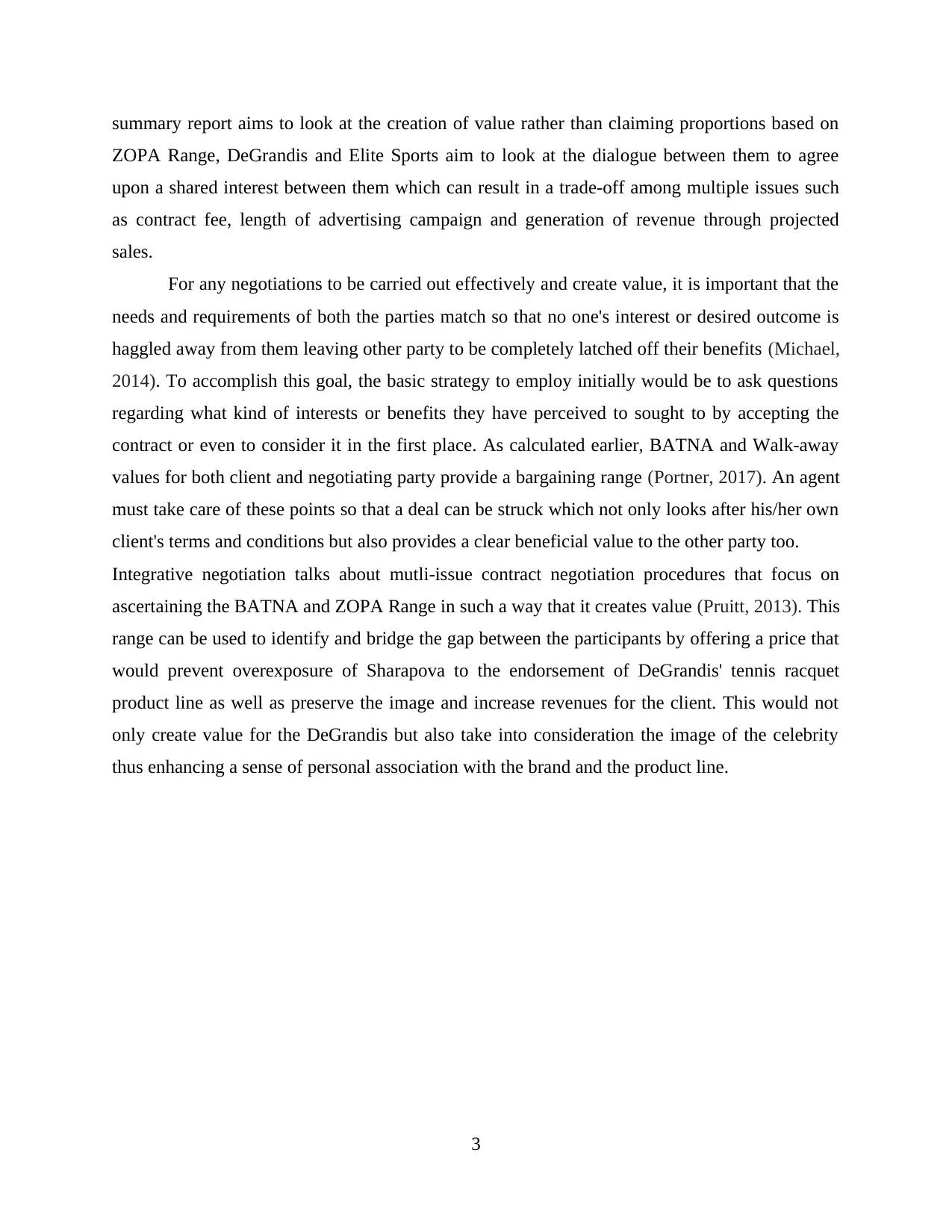
summary report aims to look at the creation of value rather than claiming proportions based on
ZOPA Range, DeGrandis and Elite Sports aim to look at the dialogue between them to agree
upon a shared interest between them which can result in a trade-off among multiple issues such
as contract fee, length of advertising campaign and generation of revenue through projected
sales.
For any negotiations to be carried out effectively and create value, it is important that the
needs and requirements of both the parties match so that no one's interest or desired outcome is
haggled away from them leaving other party to be completely latched off their benefits (Michael,
2014). To accomplish this goal, the basic strategy to employ initially would be to ask questions
regarding what kind of interests or benefits they have perceived to sought to by accepting the
contract or even to consider it in the first place. As calculated earlier, BATNA and Walk-away
values for both client and negotiating party provide a bargaining range (Portner, 2017). An agent
must take care of these points so that a deal can be struck which not only looks after his/her own
client's terms and conditions but also provides a clear beneficial value to the other party too.
Integrative negotiation talks about mutli-issue contract negotiation procedures that focus on
ascertaining the BATNA and ZOPA Range in such a way that it creates value (Pruitt, 2013). This
range can be used to identify and bridge the gap between the participants by offering a price that
would prevent overexposure of Sharapova to the endorsement of DeGrandis' tennis racquet
product line as well as preserve the image and increase revenues for the client. This would not
only create value for the DeGrandis but also take into consideration the image of the celebrity
thus enhancing a sense of personal association with the brand and the product line.
3
ZOPA Range, DeGrandis and Elite Sports aim to look at the dialogue between them to agree
upon a shared interest between them which can result in a trade-off among multiple issues such
as contract fee, length of advertising campaign and generation of revenue through projected
sales.
For any negotiations to be carried out effectively and create value, it is important that the
needs and requirements of both the parties match so that no one's interest or desired outcome is
haggled away from them leaving other party to be completely latched off their benefits (Michael,
2014). To accomplish this goal, the basic strategy to employ initially would be to ask questions
regarding what kind of interests or benefits they have perceived to sought to by accepting the
contract or even to consider it in the first place. As calculated earlier, BATNA and Walk-away
values for both client and negotiating party provide a bargaining range (Portner, 2017). An agent
must take care of these points so that a deal can be struck which not only looks after his/her own
client's terms and conditions but also provides a clear beneficial value to the other party too.
Integrative negotiation talks about mutli-issue contract negotiation procedures that focus on
ascertaining the BATNA and ZOPA Range in such a way that it creates value (Pruitt, 2013). This
range can be used to identify and bridge the gap between the participants by offering a price that
would prevent overexposure of Sharapova to the endorsement of DeGrandis' tennis racquet
product line as well as preserve the image and increase revenues for the client. This would not
only create value for the DeGrandis but also take into consideration the image of the celebrity
thus enhancing a sense of personal association with the brand and the product line.
3
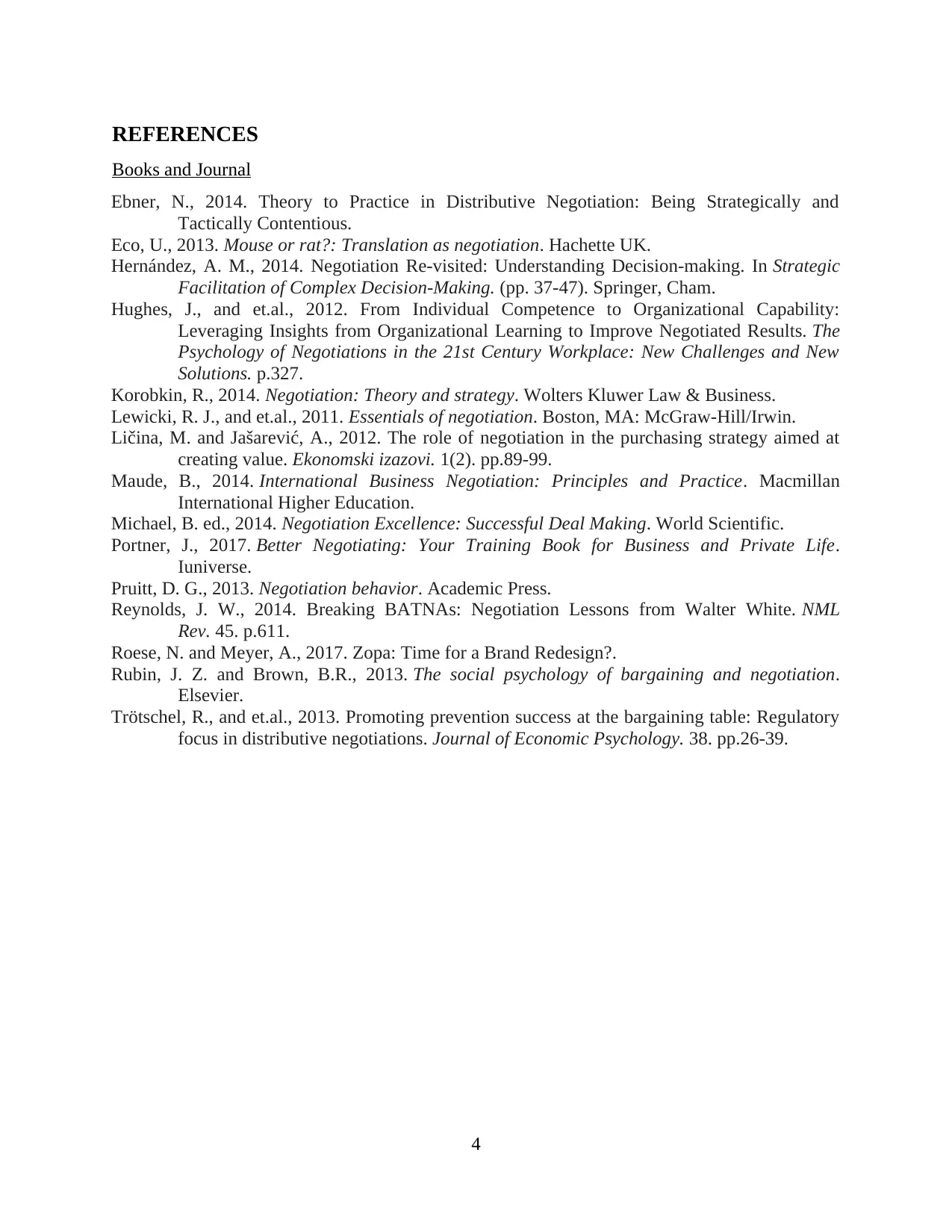
REFERENCES
Books and Journal
Ebner, N., 2014. Theory to Practice in Distributive Negotiation: Being Strategically and
Tactically Contentious.
Eco, U., 2013. Mouse or rat?: Translation as negotiation. Hachette UK.
Hernández, A. M., 2014. Negotiation Re-visited: Understanding Decision-making. In Strategic
Facilitation of Complex Decision-Making. (pp. 37-47). Springer, Cham.
Hughes, J., and et.al., 2012. From Individual Competence to Organizational Capability:
Leveraging Insights from Organizational Learning to Improve Negotiated Results. The
Psychology of Negotiations in the 21st Century Workplace: New Challenges and New
Solutions. p.327.
Korobkin, R., 2014. Negotiation: Theory and strategy. Wolters Kluwer Law & Business.
Lewicki, R. J., and et.al., 2011. Essentials of negotiation. Boston, MA: McGraw-Hill/Irwin.
Ličina, M. and Jašarević, A., 2012. The role of negotiation in the purchasing strategy aimed at
creating value. Ekonomski izazovi. 1(2). pp.89-99.
Maude, B., 2014. International Business Negotiation: Principles and Practice. Macmillan
International Higher Education.
Michael, B. ed., 2014. Negotiation Excellence: Successful Deal Making. World Scientific.
Portner, J., 2017. Better Negotiating: Your Training Book for Business and Private Life.
Iuniverse.
Pruitt, D. G., 2013. Negotiation behavior. Academic Press.
Reynolds, J. W., 2014. Breaking BATNAs: Negotiation Lessons from Walter White. NML
Rev. 45. p.611.
Roese, N. and Meyer, A., 2017. Zopa: Time for a Brand Redesign?.
Rubin, J. Z. and Brown, B.R., 2013. The social psychology of bargaining and negotiation.
Elsevier.
Trötschel, R., and et.al., 2013. Promoting prevention success at the bargaining table: Regulatory
focus in distributive negotiations. Journal of Economic Psychology. 38. pp.26-39.
4
Books and Journal
Ebner, N., 2014. Theory to Practice in Distributive Negotiation: Being Strategically and
Tactically Contentious.
Eco, U., 2013. Mouse or rat?: Translation as negotiation. Hachette UK.
Hernández, A. M., 2014. Negotiation Re-visited: Understanding Decision-making. In Strategic
Facilitation of Complex Decision-Making. (pp. 37-47). Springer, Cham.
Hughes, J., and et.al., 2012. From Individual Competence to Organizational Capability:
Leveraging Insights from Organizational Learning to Improve Negotiated Results. The
Psychology of Negotiations in the 21st Century Workplace: New Challenges and New
Solutions. p.327.
Korobkin, R., 2014. Negotiation: Theory and strategy. Wolters Kluwer Law & Business.
Lewicki, R. J., and et.al., 2011. Essentials of negotiation. Boston, MA: McGraw-Hill/Irwin.
Ličina, M. and Jašarević, A., 2012. The role of negotiation in the purchasing strategy aimed at
creating value. Ekonomski izazovi. 1(2). pp.89-99.
Maude, B., 2014. International Business Negotiation: Principles and Practice. Macmillan
International Higher Education.
Michael, B. ed., 2014. Negotiation Excellence: Successful Deal Making. World Scientific.
Portner, J., 2017. Better Negotiating: Your Training Book for Business and Private Life.
Iuniverse.
Pruitt, D. G., 2013. Negotiation behavior. Academic Press.
Reynolds, J. W., 2014. Breaking BATNAs: Negotiation Lessons from Walter White. NML
Rev. 45. p.611.
Roese, N. and Meyer, A., 2017. Zopa: Time for a Brand Redesign?.
Rubin, J. Z. and Brown, B.R., 2013. The social psychology of bargaining and negotiation.
Elsevier.
Trötschel, R., and et.al., 2013. Promoting prevention success at the bargaining table: Regulatory
focus in distributive negotiations. Journal of Economic Psychology. 38. pp.26-39.
4
⊘ This is a preview!⊘
Do you want full access?
Subscribe today to unlock all pages.

Trusted by 1+ million students worldwide
1 out of 6
Related Documents
Your All-in-One AI-Powered Toolkit for Academic Success.
+13062052269
info@desklib.com
Available 24*7 on WhatsApp / Email
![[object Object]](/_next/static/media/star-bottom.7253800d.svg)
Unlock your academic potential
Copyright © 2020–2026 A2Z Services. All Rights Reserved. Developed and managed by ZUCOL.





